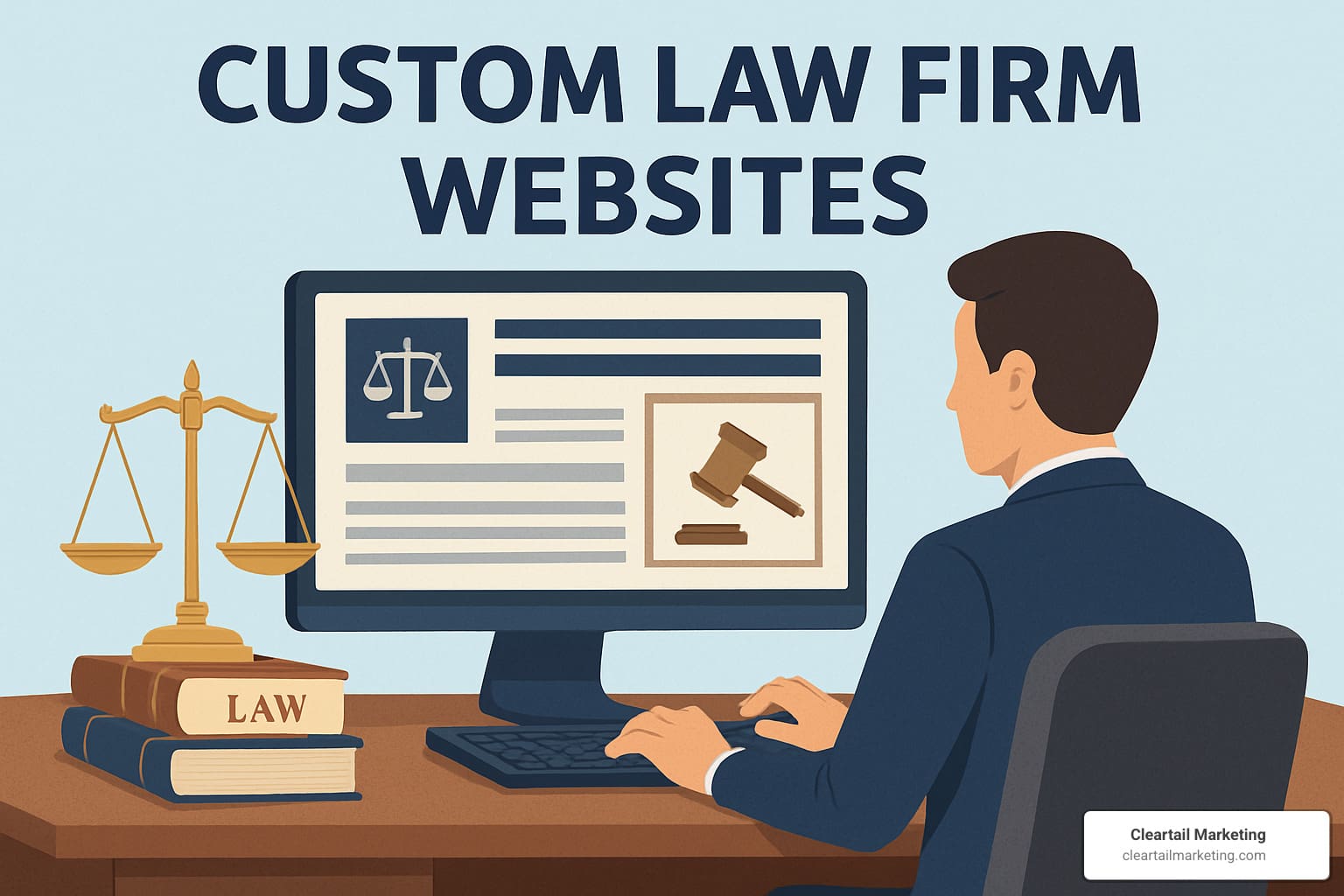Why Your Law Firm’s Website Is Your Most Important Marketing Asset
Custom law firm websites are professional, custom online platforms designed specifically for legal practices to attract clients, showcase expertise, and differentiate from competitors. Unlike template-based solutions, these websites offer:
- Unique branding that reflects your firm’s personality and values
- Advanced functionality including client portals, intake forms, and payment processing
- Superior SEO performance with optimized code and site structure
- Mobile-responsive design that works flawlessly on all devices
- Integration capabilities with practice management software like MyCase or Clio
- Complete ownership of your website and domain
The numbers tell a compelling story. According to the American Bar Association’s 2023 TechReport, 87% of law firms had websites in 2023, but adoption varies dramatically by firm size. While 97% of large firms maintain an online presence, only 65% of solo practitioners have established one – creating a massive opportunity for smaller practices to stand out.
The stakes couldn’t be higher. Your website often serves as the first point of contact between your firm and potential clients. As one industry expert noted, “Your website is your most important marketing asset. It should be a unique reflection of your company, not a cookie-cutter website that looks like your competitors.”
The return on investment speaks for itself. Jacob D. Fuchsberg Law Firm saw a 1,062% ROI after their website redesign, while Omar Ochoa Law Firm experienced a 919% jump in organic traffic. These aren’t outliers – they’re examples of what happens when law firms invest in professional, custom web solutions.
I’m Magee Clegg, founder and CEO of Cleartail Marketing, and I’ve helped over 90 B2B companies grow through strategic digital marketing since 2014. Through our work with law firms, I’ve seen how custom law firm websites transform practices by generating qualified leads and establishing market authority.
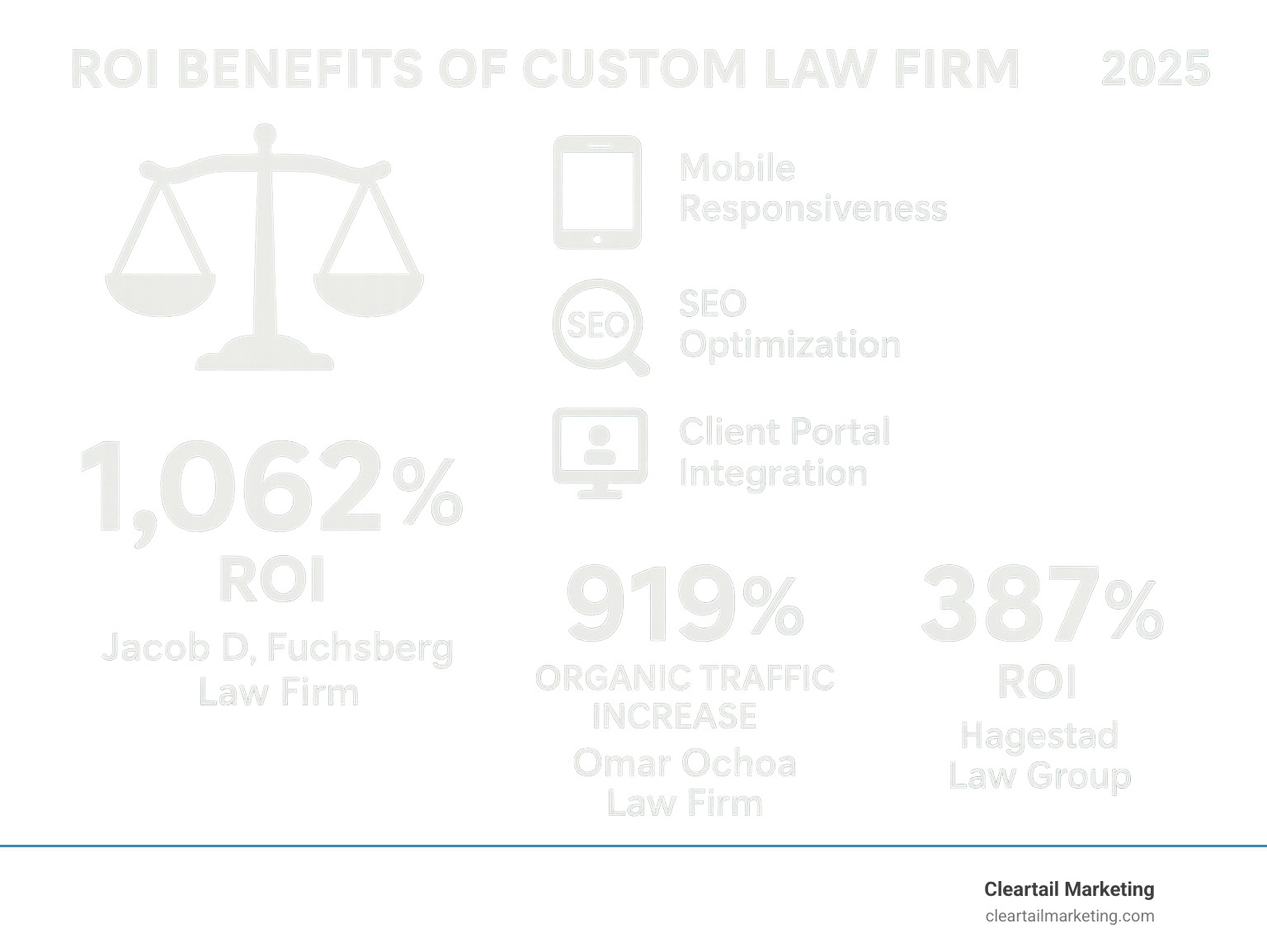
Custom law firm websites vocab explained:
Why Invest in Custom Law Firm Websites Over Templates?
Think of your law firm’s website as your virtual office. If every firm on the block used the same furniture and layout, how would you stand out? That’s the problem with template websites. The choice between a custom website and a template isn’t just about aesthetics; it’s about your firm’s future growth.
Here’s a quick look at how custom law firm websites stack up against generic templates:
| Feature | Custom Websites | Template Websites |
|---|---|---|
| Branding | Unique, custom to your firm’s identity | Generic, shared with thousands of others |
| SEO Performance | Optimized code, custom structure | Limited by template constraints |
| Scalability | Grows with your practice | Restricted by template limitations |
| Functionality | Any feature you need | Limited to template options |
| Cost | Higher upfront, better long-term ROI | Lower initial cost, limited returns |
According to the ABA’s 2023 report, 42% of law firms outsource their website design. Those that choose custom law firm websites gain a significant strategic edge. As one legal marketing expert noted, the industry is often “rife with generic, lazy, uninspired design.”
A custom law firm website helps you break free from this “cookie-cutter” problem. They aren’t just digital brochures; they’re powerful tools that work around the clock to bring in new clients. Our Website Design and Development Agency Services focus on building these high-performing platforms that turn visitors into clients.
Building Trust and Authority
Trust is the bedrock of any attorney-client relationship, and that process begins on your website. A custom design showcases your competence and attention to detail in ways a template can’t. It’s the difference between a custom suit and one off-the-rack—the custom fit is sharper and more professional.
Take Hagestad Law Group. Their website redesign, which used StoryBrand principles and a custom user experience (UX), resulted in an incredible 387% ROI. They also saw a 54% increase in qualified leads and a 119% jump in conversion rates. Their success came from showcasing their unique value through custom design.
A smooth, cohesive experience guides visitors to take action. This means having:
- Professional branding that reflects your firm’s personality.
- Clear messaging that states your unique value.
- Strategic placement of client testimonials and case results.
- Compelling calls-to-action that make it easy for visitors to become leads.
With a custom website, you control every element to achieve your firm’s specific goals.
Gaining a Competitive SEO Advantage
Search Engine Optimization (SEO) requires technical excellence that only custom development can fully provide. When you control your website’s code, you control your SEO destiny. It’s like having a custom-built race car versus a standard sedan.
Omar Ochoa Law Firm’s 919% jump in organic traffic wasn’t luck. Their custom law firm website allowed for:
- An optimized site structure custom to their practice areas.
- Faster page speeds, which Google and users love.
- Core Web Vitals optimization to meet Google’s key performance metrics.
- Smart Local SEO implementation to target clients geographically.
- Advanced technical SEO features that templates can’t accommodate.
Template websites limit your SEO potential because they are one-size-fits-all. Custom law firm websites, on the other hand, allow our team to implement cutting-edge SEO strategies that bring qualified potential clients right to your digital doorstep. Dive deeper into how we do this with our comprehensive Law Firm Web Marketing services.
Must-Have Features for a High-Performing Website
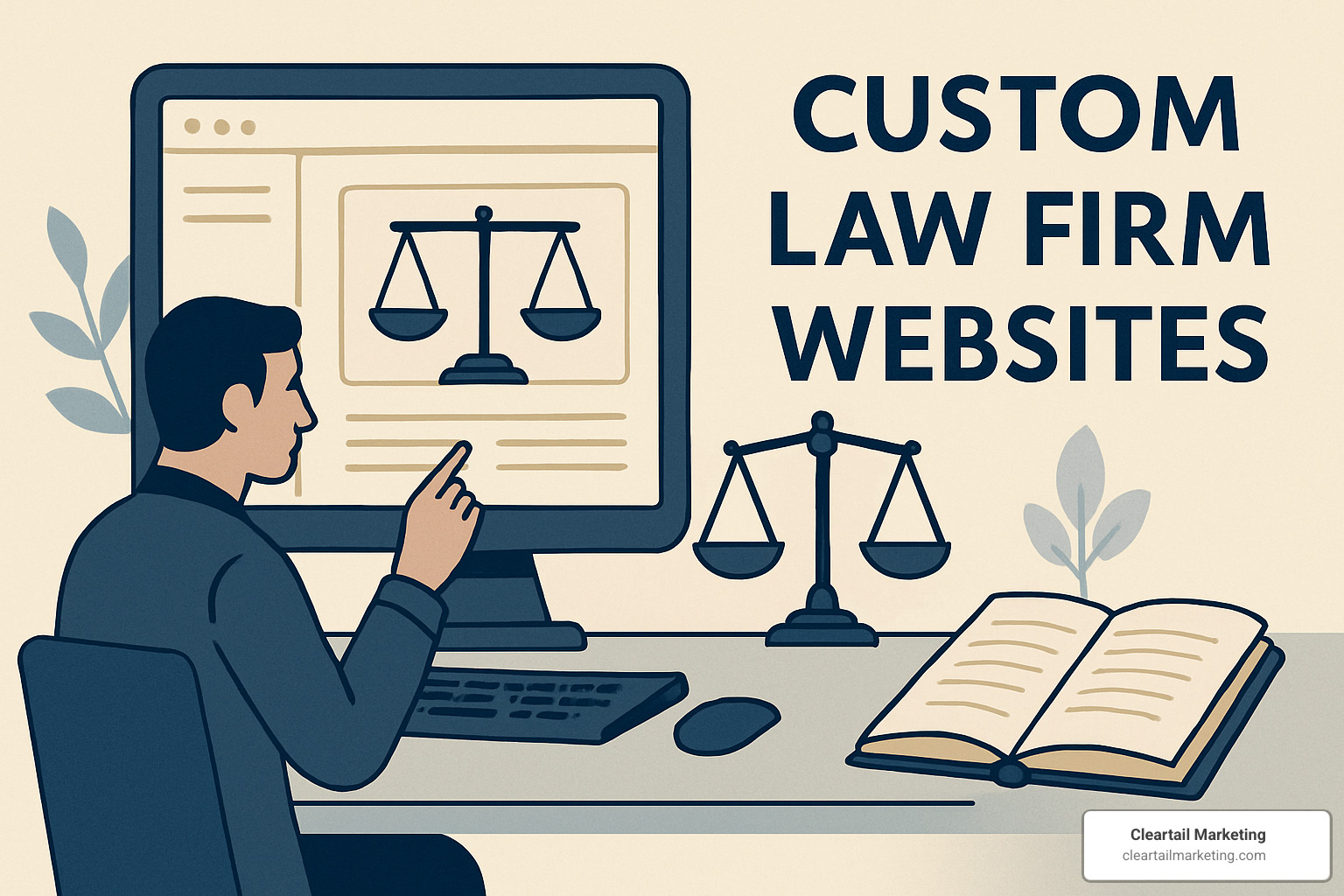
A website should be your hardest-working employee. The difference between a digital business card and a client-generation machine comes down to the features you choose and how well they work together.
Essential Features of High-Performing Custom Law Firm Websites
- Professional branding that instantly conveys competence. Think of it as your digital suit1t has to fit perfectly.
- Mobile-responsive design so the site looks flawless on phones, tablets, and desktops.
- Fast loading speeds Slow sites lose impatient prospects.
- Intuitive navigation that guides visitors exactly where they need to go in just a click or two.
- Clear calls-to-action (CTAs) on every page, telling visitors what to do next1call, book, or complete a form.
- Attorney bios with professional photos and credentials that humanize your practice.
- Detailed practice-area pages that prove youre the right choice for a specific legal need.
- High-quality imagery or video Real photos of your team and office outshine generic stock art.
One recent redesign for Yarborough Law Group produced an 844% ROI, a 45% boost in qualified leads, and a 327% jump in conversion ratesall by applying the best practices above.
Advanced Functionalities for Client Conversion
- Secure contact forms and live chat so prospects can reach you the way they prefer.
- Client intake forms to collect key details before the first meeting.
- Integrations with practice-management tools (MyCase, Clio) to eliminate double entry.
- Client portals for document sharing and case updates.
- Online payment processing that makes it painless to pay retainers and invoices.
- Blog or insights section for fresh content that supports SEO and demonstrates expertise.
- Strategic social proof testimonials, reviews, and awards placed where they build maximum trust.
Our WordPress Website Design and Development service bundles these essentials into one streamlined solution, so your website works as hard as you do.
The Design Process, Timeline, and Budget
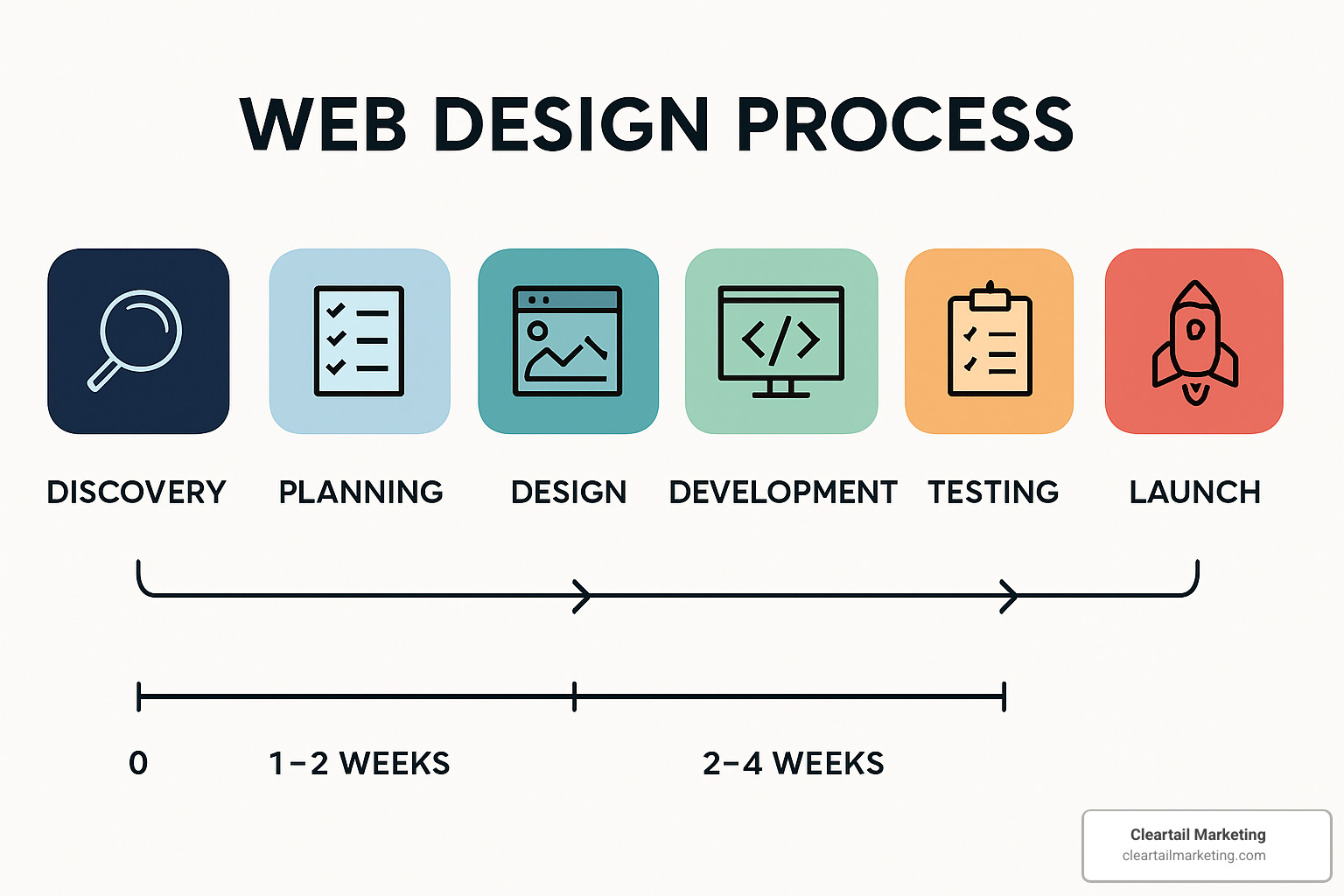
Building a custom law firm website is systematic, not mysterious. Think of it like constructing a house1we follow a blueprint so nothing is left to chance.
The Step-by-Step Build Process
- Findy & strategy We align on goals, target clients, and competitive gaps.
- Sitemap & wireframes A click-by-click blueprint of pages and flow.
- Custom design mockups Visual drafts refined through your feedback.
- Content creation or integration Copy that positions you as the clear choice.
- Development & coding Clean, SEO-ready code built for speed.
- Quality assurance Rigorous testing on every browser and device.
- Launch & support We deploy the site and remain on call for updates.
Understanding Costs & Timelines
Project scope drives price more than anything else:
- Simple custom sites (5–10 pages): often $4k–$8k, delivered in 2–6 weeks.
- Mid-range builds with integrations: typically $10k–$25k, completed in 2–4 months.
- Enterprise-level sites with portals, advanced SEO, or multilingual content can exceed $40k and take 4–6 months.
For context, some legal-industry specialists charge far moreGreat Jakes, for instance, starts around $40,000. On the budget end, template providers advertise sites for a few hundred dollars, but those trade long-term ROI for short-term savings.
The key takeaway: youre not buying pixels, youre investing in a 24/7 marketing asset. Firms that launch a strategic, custom site routinely see cost-per-lead figures well below industry averages, recouping the build cost in months rather than years.
How to Choose the Right Web Design Partner
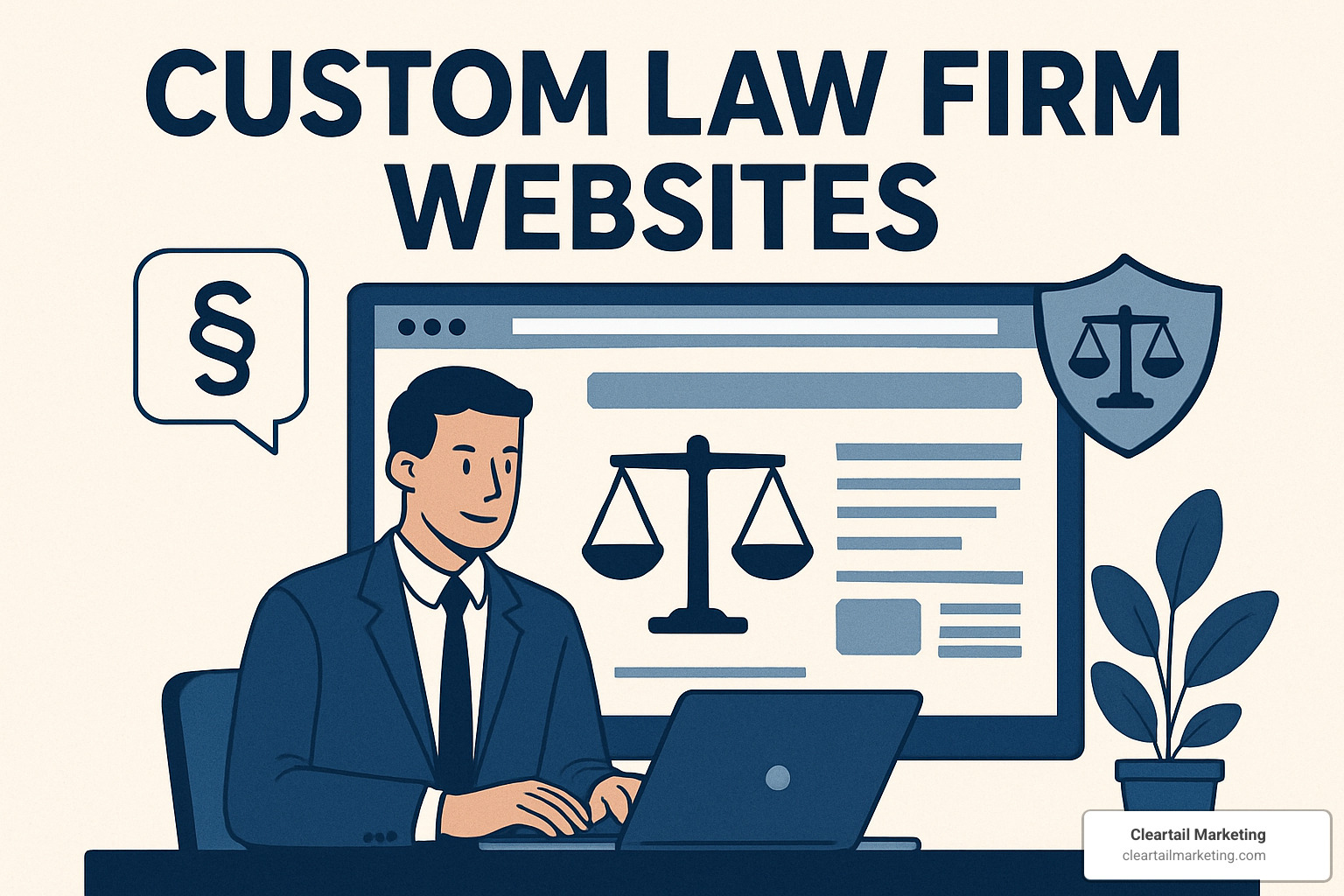
Choosing the right partner to build your website is just as important as the website itself. Think of it like picking the right co-counsel for a big case. The wrong choice can lead to missed chances, wasted money, and a lot of headaches down the road. You want a team that truly understands your firm and your goals.
Vetting a Potential Design Agency
When you’re looking for a web design agency, it’s wise to ask a lot of questions. You’re building a long-term relationship here, so make sure they’re a good fit.
First, dig into their experience and expertise. Do they specifically work with law firms? Can they show you examples of Custom law firm websites they’ve built for practices like yours? It’s key that they understand legal marketing and SEO, and even better if they know about legal industry compliance. This ensures they “get” your world.
Next, talk about their process and communication. How do they actually build a website, step by step? How do they handle your feedback and make revisions? Knowing who your main point of contact will be, and what their typical project timeline looks like, helps set clear expectations.
Then, discuss ownership and support. This is huge! You must confirm that you will own your website, domain, and all its assets once it’s done. Ask what kind of ongoing support they offer. What happens with maintenance and updates? And what if, someday, you decide to switch providers? A good agency will make this process clear and fair.
Finally, ask about results and ROI. Can they share success stories or case studies with real, measurable outcomes? How do they measure a website’s success? What’s their plan for turning visitors into clients? Do they offer ongoing marketing help after the launch? These questions show if they’re focused on your growth.
When you’re looking at their past work, here’s a quick checklist for reviewing their portfolio:
- Look for designs that are clean and professional.
- Check that the websites look good and work well on phones and tablets (mobile-responsive).
- Test how fast the sites load.
- Read any client testimonials they share.
- See if they have experience in the legal industry.
Red Flags to Watch Out For
Just as there are good signs, there are also warning signs that tell you to be careful. Watch out for these red flags when you’re choosing a web design partner.
Be very wary of vendor lock-in practices. This means an agency might make it hard for you to take your website elsewhere later. Reputable agencies, like PaperStreet, are clear: “We do not believe in vendor lock-in.” You should always have full ownership of your site. It’s your digital property.
Watch out for hidden fees and unclear pricing. A trustworthy agency will give you a clear, itemized quote upfront. If they’re vague about costs or have “mystery maintenance” fees, that’s a red flag. You should know exactly what you’re paying for.
Poor communication during the sales process is a big warning sign. If they’re slow to respond or hard to get a hold of now, imagine how that will feel when your project is underway. Good communication is the bedrock of any successful partnership.
Avoid agencies that offer one-size-fits-all packages. Building a great Custom law firm website needs a custom approach. If they try to push the same exact solution on everyone, they likely don’t truly understand your firm’s unique needs and goals.
Be skeptical of anyone overpromising SEO results. No one can truly guarantee specific top rankings or a massive jump in traffic overnight. Good SEO takes time, effort, and involves many changing factors. If it sounds too good to be true, it probably is.
Lastly, check their outdated portfolio. If all their recent work looks old-fashioned or doesn’t use the latest technology, they might not be keeping up with modern design trends and web standards. You want a partner who’s forward-thinking.
At Cleartail Marketing, we believe in being open, communicating clearly, and delivering real results. Our clients always have full ownership of their websites, and we provide ongoing support to help your firm continue to grow and succeed online.
Frequently Asked Questions about Law Firm Websites
How long does it take to build a custom law firm website?
The timeline for building custom law firm websites varies dramatically depending on what you actually mean by “custom.” When MyCase claims they can build custom law firm websites in as little as 10 days, they’re really talking about a streamlined, templated approach with minimal customization.
For truly custom websites that are built from scratch for your specific practice, you’re looking at a more realistic timeline. Simple custom sites with basic features typically take 2-6 weeks to complete. These include custom design, mobile responsiveness, and standard functionality like contact forms and practice area pages.
More complex custom builds require 2-4 months to complete properly. These sites include advanced functionality, custom integrations with your practice management software, comprehensive content creation, and sophisticated SEO optimization.
For large firms requiring enterprise-level sites, PaperStreet notes that the timeline can stretch to 4-6 months or longer. These projects involve extensive features, complex integrations, and multiple rounds of stakeholder feedback.
Several factors influence your project timeline. The complexity of your design and functionality requirements plays a major role. Content creation takes time, especially if you need professional copywriting for multiple practice areas. The number of revision cycles and your responsiveness during the review process also impacts timing.
Integration requirements with existing systems like MyCase or Clio can add weeks to your timeline. However, this investment pays off with streamlined client management and improved efficiency.
Do I own my website after it’s built?
This is absolutely the most important question to ask before signing any contract with a web design agency. You should own 100% of your website, and any reputable agency will guarantee this in writing.
Dan Gilroy Design makes this commitment crystal clear: “You own 100% of your website. That includes the content, the domain, the platform – everything. We put this in writing.” This is exactly what you should expect from any professional web design partner.
PaperStreet takes a similar stance, stating: “We do not believe in vendor lock-in, which often happens with most web design companies.” They ensure clients can take their website to any other provider if desired, which demonstrates confidence in their service quality.
What complete ownership means: You should own your website design and all visual assets, your domain name registration, all website content and images, the source code and files, and either your hosting account or the ability to transfer it easily.
Unfortunately, some agencies use predatory practices to maintain control over your digital assets. Be wary of agencies that insist on maintaining control of your domain, contracts that don’t clearly state ownership rights, proprietary systems that make transferring impossible, or ongoing fees disguised as “rental” of your website.
At Cleartail Marketing, we believe you should own your website completely. It’s your business asset, and you should have full control over it.
Why is a custom website better for SEO than a template?
Custom law firm websites provide significant SEO advantages that templates simply cannot match, and the results speak for themselves. Omar Ochoa Law Firm’s custom website redesign resulted in a 919% jump in organic traffic, while Jacob D. Fuchsberg Law Firm achieved a 147% increase in organic traffic along with their 1,062% ROI.
Code optimization is where custom sites really shine. Custom development allows us to write clean, optimized code specifically for your needs. Templates often include unnecessary code that slows down your site and hurts SEO performance. When you’re competing for clients searching for legal services, every millisecond of loading time matters.
Site structure control gives you a massive advantage. Custom development allows for site architecture optimized for your specific practice areas and client journey. Instead of forcing your content into a template’s predetermined structure, we build the structure around your content strategy.
Page speed optimization becomes possible when you’re not constrained by template limitations. Custom sites can be optimized for Core Web Vitals and loading speed without worrying about breaking template functionality. Since Google uses page speed as a ranking factor, this directly impacts your search visibility.
Unique content structure helps you stand out from competitors using similar templates. When every personal injury lawyer in your city uses the same template, custom design makes you memorable and builds trust with potential clients.
Advanced SEO features like schema markup, custom meta structures, and optimized internal linking can be implemented seamlessly in custom sites. Templates may not support these features, or they may conflict with the template’s existing code.
Mobile optimization goes beyond basic responsiveness. While templates may be “mobile-responsive,” custom sites can be optimized specifically for mobile user experience and performance, which is crucial since most legal searches happen on mobile devices.
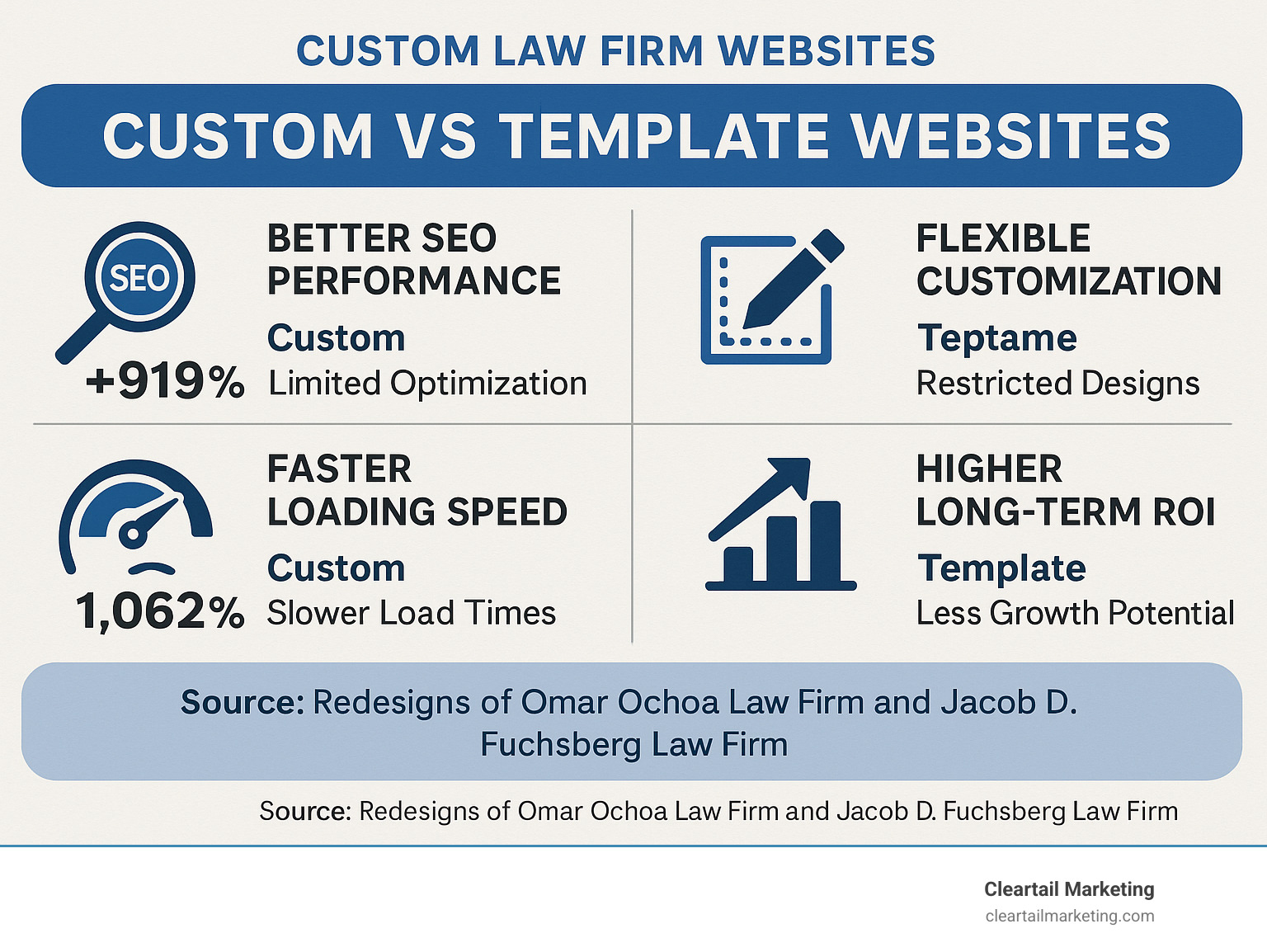
Conclusion: Your Verdict on a Winning Digital Strategy
The evidence, much like a well-presented case, is overwhelmingly clear: investing in a custom law firm website isn’t merely about having an online presence. It’s about building your firm’s most powerful marketing asset, one that works tirelessly around the clock to fuel your growth.
We’ve seen the compelling results throughout this discussion. The verdict is in, and it’s a resounding “guilty” — guilty of driving incredible success! Consider Hagestad Law Group’s impressive 387% ROI, or Omar Ochoa Law Firm’s remarkable 919% jump in organic traffic. And let’s not forget Jacob D. Fuchsberg Law Firm, who saw an astounding 1,062% ROI after their website redesign. These aren’t just isolated incidents; they’re shining examples of what happens when law firms make a smart, strategic investment in professional, custom web solutions.
In today’s legal landscape, a strong, professional online presence isn’t just a nice-to-have; it’s absolutely essential for competing and thriving. While 87% of law firms now have websites, there’s still a significant opportunity for solo practitioners, with only 65% currently online. This creates a fantastic chance for smaller practices to truly stand out and capture market share.
A custom law firm website gives you the strategic advantage you need to truly shine. It helps you establish credibility and build trust with potential clients right from the first click. It’s designed to attract your ideal clients by speaking directly to their needs with targeted messaging and design. Most importantly, it helps you generate measurable ROI, turning visitors into qualified leads and ultimately, new clients. This allows you to compete effectively even against larger, more established firms, and build a lasting digital asset that evolves and grows right alongside your practice.
So, the real question isn’t whether you can afford to invest in a custom website, but rather, can you afford not to? Every day your firm operates without a strong, professional online presence is a day your competitors are potentially capturing the very clients you could be serving. Don’t let them win by default!
At Cleartail Marketing, we truly understand the unique challenges law firms face in attracting and converting clients online. Our custom website solutions are built on a foundation of strategic design, advanced functionality, and proven marketing principles. We create websites that don’t just look professional and polished, but actively contribute to your firm’s ongoing growth and success.
Ready to build a website that works as hard as you do? Explore our Law Firm Web Design services.
Your future clients are out there, searching for legal services online right this very moment. Make sure they find you first – with a custom website that’s so effective, it’ll make your competitors object to your success!


